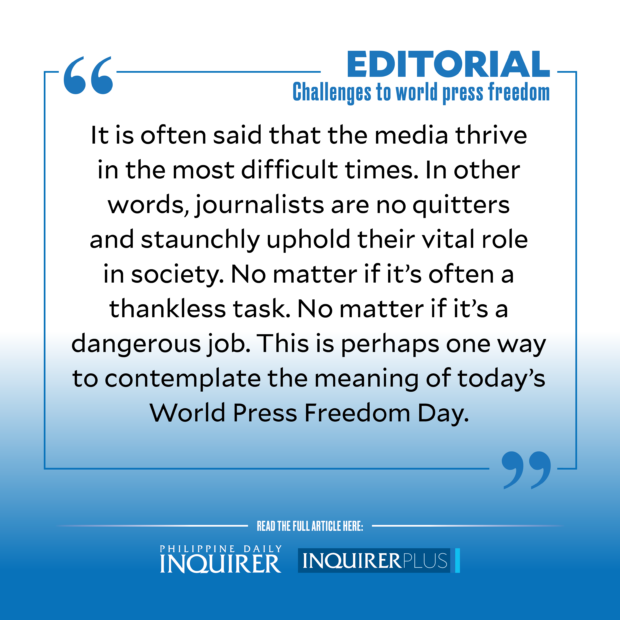Challenges to world press freedom
 Today marks the 30th anniversary of the declaration of May 3 as World Press Freedom Day by the United Nations (UN) General Assembly. For newsrooms in many countries, including the Philippines, there seems little to celebrate and plenty to think about on how that aspiration has evolved in the past three decades.
Today marks the 30th anniversary of the declaration of May 3 as World Press Freedom Day by the United Nations (UN) General Assembly. For newsrooms in many countries, including the Philippines, there seems little to celebrate and plenty to think about on how that aspiration has evolved in the past three decades.
The idea to celebrate World Press Freedom Day sprang from the recognition that freedom of speech or expression is the driver of other basic human rights. The United Nations Educational, Scientific, and Cultural Organization (Unesco), in its concept note for today’s milestone event, pointed out the four fundamental freedoms outlined in the preamble of the 1948 Universal Declaration of Human Rights, which are the freedom of speech, freedom of belief, freedom from fear, and freedom from want.
“It is not incidental that freedom of speech comes first: this fundamental freedom is one that enables all others,” Unesco said. Accordingly, it added, the right to freedom of expression and its corollary, the right to access information, “allow us to seek, receive, and impart information, ideas, concepts, and beliefs across borders and cultures.’’
Media freedom, Unesco stressed, is essential to freedom of information. “And in this exercise, the media and journalists play an essential role: they help verify and disseminate facts, they create spaces for ideas to be debated and for the voiceless to be heard, and they render complex matters intelligible for the public at large,” the UN agency said.
Through investigative journalism, the media have uncovered criminal activities and wrongdoings that affect the human rights of citizens, Unesco noted. “Without a free flow of information, and the help of the media in this effort, most cases of malpractice, corruption, and human rights violations would remain hidden. And without collective awareness of these violations, we would not be able to act to address them,’’ it added.
Thus in 1991, Unesco General Conference passed a resolution recommending to the UN the declaration of World Press Freedom Day, with the assembly formally adopting it in 1993 and setting aside May 3 of every year to mark the day. World Press Freedom Day serves to remind governments to honor their commitment to protect media freedom and other fundamental rights, and for media practitioners to reflect on their profession.
Thirty years later, the challenges to press freedom have only intensified. Huge advances in digital technology have changed the way people access information, upending the traditional media’s dominance in disseminating vital news and information to the public. Social media platforms enable anyone to publish and share information to an unlimited audience. Without the ability to verify or vet information, which media professionals are trained to do, social media users wittingly or unwittingly pass on dubious information, giving rise to the alarming spread of disinformation, misinformation, and propaganda.News organizations scrambling to correct the raft of “fake news” flooding digital space, however, found themselves becoming targets of vilification and online attacks by social media armies mobilized by political or vested interests. Public distrust of media soon became manifest in many countries. This distrust was no doubt aided by populist leaders who have branded media as the enemy or, in the case of the Philippines, Red-tagged journalists because they didn’t like critical reporting. The outright attacks on members of the media have also resulted in a number of them being jailed or killed over the past years.The pandemic further exacerbated the financial hardships of many news organizations, with even long-established news brands closing down or shifting to digital platforms to adapt and survive.
In the meantime, economic, social, political, and climate crises are driving people deeper into poverty, despair, and harm. War, conflict, and a relentless pandemic have exacted a heavy death toll across borders.
It is often said that the media thrive in the most difficult times. In other words, journalists are no quitters and staunchly uphold their vital role in society. No matter if it’s often a thankless task. No matter if it’s a dangerous job. This is perhaps one way to contemplate the meaning of today’s World Press Freedom Day.
The media’s responsibility is to seek the truth, hold the government accountable, and become the voice of the voiceless and the marginalized. They exist to inform, educate, and empower citizens so they can fight for their rights and demand good governance and a just society.
To perform its essential role, the media must be free and independent, but also bound by ethical and professional conduct. And in the face of technological disruptions and intolerant governments that threaten their very existence and relevance, the media must strive to reach, not alienate, the people they are trying to serve.




















